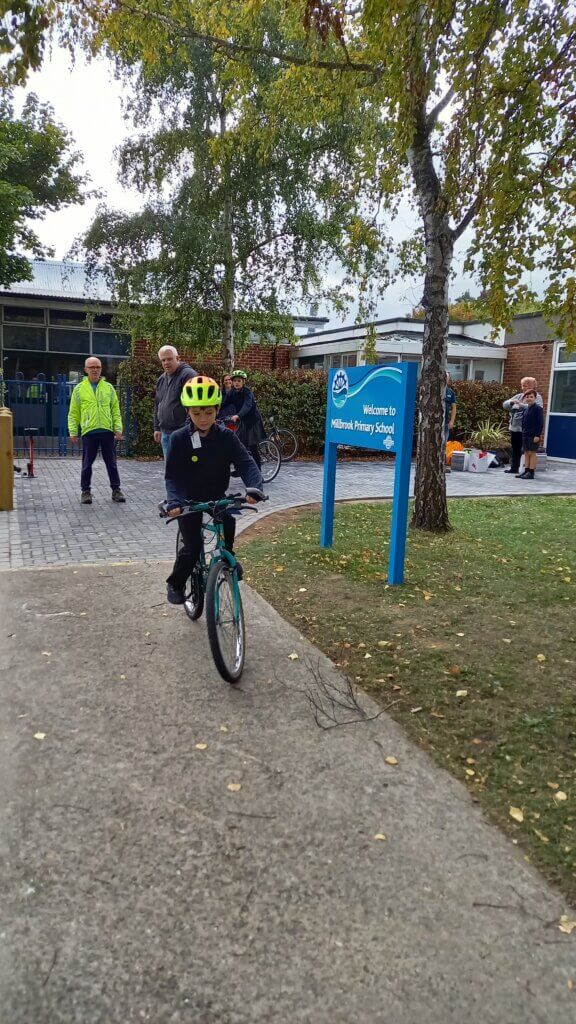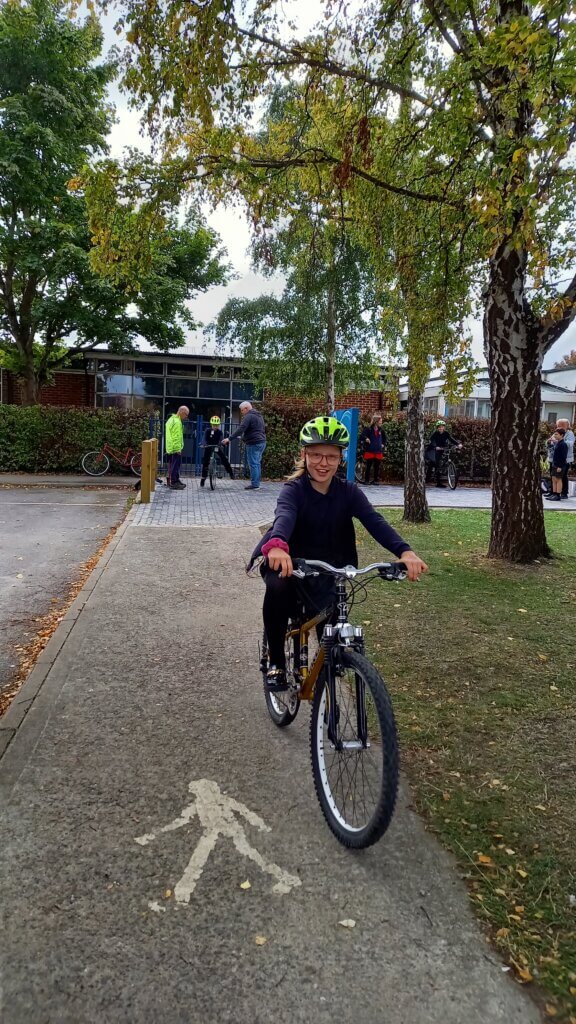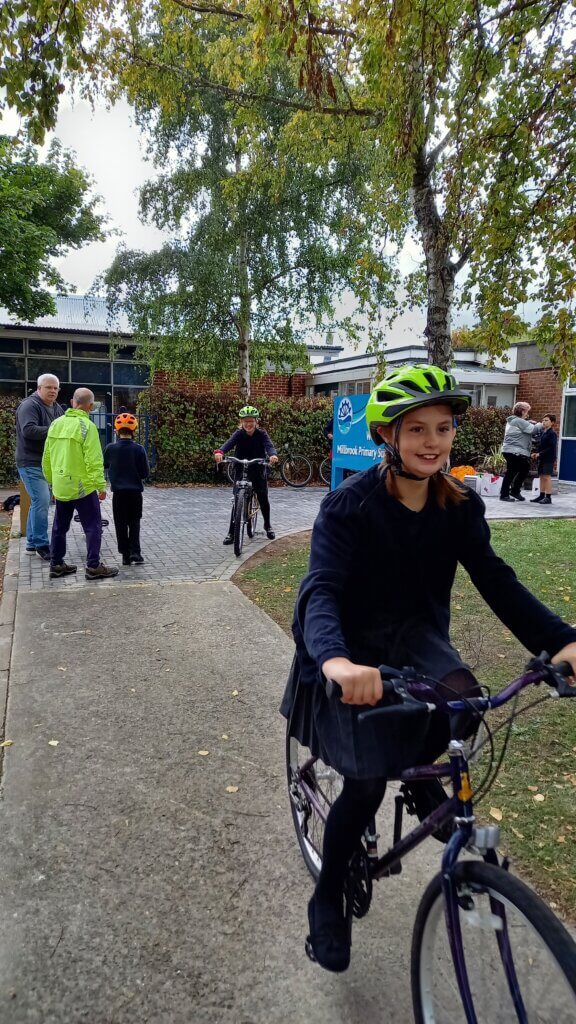Equipping Children to Embed Cycling in their Lives
If you are looking for a grant project that encourages children to love cycling at an early stage and can be replicated in your community, then this is it.
We were delighted to award a large grant to Sustainable Wantage from the Low Carbon Hub Community Grants Fund in March 2022.
They had the inspired idea to provide children in local primary schools with reconditioned bikes and equipment to enable them to use cycling as a viable method of making journeys, avoiding car use, and increasing health and well-being. The aim was to embed a lifelong love of cycling and an awareness of its value as a method of transport.
The grants panel were particularly impressed by the project as it benefits young people and builds on the active partnership with local schools that Sustainable Wantage created through their reconditioned laptop donation scheme during lockdown.
Our Community Grant Fund offers financial support for community energy activities across Oxfordshire. All Community Members of the Low Carbon CIC can apply for a small or large grant that can be used to fund activities that contribute to the Hub’s aim: to cut Oxfordshire’s carbon footprint and contribute to the creation of a decentralised and locally owned renewable energy system.
Community Members can apply for one of a small number of large grants of up to £5,000 that are awarded each year, in a competitive process. The application process has two stages: an outline and a full application. Community groups can apply for funding singly or in consortia with other community shareholders.
The Project
Sustainable Wantage engaged with 5 primary schools in Wantage and Grove to supply reconditioned second-hand bikes to selected Year 6 children, identified by the schools. The aim was for all children to have access to the equipment and support needed to be able to take part in Bikeability training and provide an opportunity to build a lifetime habit of active travel.
The group approached the Windrush Bike Project, a social enterprise that helps adults and children to fix donated bikes, to help with the project. They trained two volunteers, from the community in basic bike repairs and safety checking. The trained volunteers shared their knowledge with three other community members and together they located, fixed, checked, and passed on 18 bikes to the schools. Along with the bikes, they provided a helmet, bike lock, lights, pump, and puncture repair kit to each child.



Jo Harvey from Sustainable Wantage had this to say about the Windrush Bike Project:
“We would definitely recommend training with Windrush, even for volunteers that are very capable, this helped us get everyone working to agreed standards. Although after being at Windrush our volunteers had workshop envy!”
Sustainable Wantage also developed a great relationship with their local bike shop, Ridgeway Cycles, who provided generous support by sourcing supplies, such as safety helmets and repair kits, at a discounted rate and provided helpful advice and tips.
Jo Harvey described the children’s reaction to receiving the bikes and kit:
“Seeing the children’s excitement at being given a bike and ‘extra presents’ was absolutely lovely! One teacher told us he’d seen a child we’d given a bike to in June coming back from secondary school on it in September and for him that one instance had made the whole project worthwhile.”
Sustainable Wantage managed to donate a total of 18 reconditioned bikes, including 15 to school children. They donated 2 bikes to a Syrian refugee family and succeeded in linking the family with a bike buddy to support them. This has helped to encourage regular use of the bike as an alternative form of transport. The dad of this family now also volunteers at the Community Larder after meeting the group through the bike scheme.
They also donated a bike to a young man to commute to work which meant he could save money on daily bus fares.
There has been fantastic feedback from the children who received bikes, many of whom said that they now use their bikes on most days of the week. They reported feeling more confident about cycling to school, following the training with Bikeability, and felt that the barriers to cycling had been removed. Here are some of the comments from the children when asked how useful their bikes have been:
“I love it and use it all the time”
“I enjoy using it, it’s fun”
“It’s good so when I go to the shop, I don’t have to walk”
Sustainable Wantage advertised for bike donations through their newsletters and social media and Repair Cafes and received a constant supply of both adult and children’s bikes. They are still being offered bikes now and we have become known fondly as ‘bike-rescuers’ and are recruiting for volunteers again to continue to fix up the bikes and pass them on.
The shear volume of bikes being donated led to problems with storage. They created a bike storage area at their community space, The Mix, and were offered space in a nearby garage but quickly filled both spaces. The group would love to have some dedicated workshop or bike storage space so that they could dismantle unfixable bikes and save parts for spares.
If they continue the project into next year they would like to engage more with parents and supply them with bikes and equipment so that families can enjoy cycling together. They are currently preparing a bike for a parent who sometimes cycles to school on his 8 year old’s BMX bike.
If other groups are thinking of setting up a similar project in their community, Sustainable Wantage have the following advice:
- Make contact with the schools well in advance of the summer term and keep in touch regularly.
- If you can find a staff member within the school that is committed to helping get bikes to children that don’t have them, treasure them and keep communication open!
- Some of the children identified had never ridden a bike before and would have benefited from having one much more in advance of the Bikeability sessions.
- Be prepared to need a lot of space!
- Adequate storage for a large number of bikes will be needed, even if you only ask for a particular size of bike you’ll be offered all kinds and all sizes.
- Recruit a volunteer team larger than you think you’ll need, ideally have enough space for them to be able to work together for a few sessions to learn from each other and share / agree standards early on.
